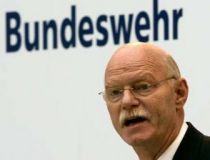INTERVIEW-Germany urges UN to accelerate Sudan peace
By Philip Blenkinsop and Markus Krah
BERLIN, June 8 (Reuters) – Germany’s defence minister will travel to New York this month to urge U.N. Secretary-General Kofi Annan to tackle problems besetting a peacekeeping mission in southern Sudan in which Germany has a role.
 Defence Minister Peter Struck announced plans for the trip in an interview with Reuters, declaring he was “extremely sceptical” about the mission to oversee the peace between Sudan and the rebel Sudan People’s Liberation Movement.
Defence Minister Peter Struck announced plans for the trip in an interview with Reuters, declaring he was “extremely sceptical” about the mission to oversee the peace between Sudan and the rebel Sudan People’s Liberation Movement.
Struck said there was little sign that the Khartoum government, which is also facing a major conflict in western Darfur province, was willing to accept foreign intervention.
“I am very annoyed that the United Nations has not managed to break the opposition of the Sudanese government,” he said.
Germany plans to deploy 50 to 75 unarmed military observers to southern Sudan to oversee peacekeeping after warring parties signed a treaty in January to end Africa’s longest civil war, a two-decade conflict that has killed 2 million people.
The United Nations Mission in Sudan (UNMIS), with about 10,000 troops, will monitor the deal, but Struck said delays meant the force currently numbered only around 1,500.
German observers could not oversee peace in the six regions planned if there were no troops there. Annan therefore needed to meet the Sudanese government and overcome its opposition to the plan, Struck said.
“I will therefore travel specially to New York in two weeks to speak with Kofi Annan about the situation in Sudan.”
IRAQ MISSION?
Struck, a member of Chancellor Gerhard Schroeder’s Social Democrats (SPD) also challenged the main opposition conservatives to spell out ahead of a likely general election in September, whether they would send troops to Iraq.
“We will not go into Iraq, that’s quite clear,” Struck said, referring to the Schroeder government’s policy.
“I hear different signals from the (conservative) union as they are looking to be closer to the United States,” he said.
Schroeder snatched victory from the jaws of defeat in 2002 in part due to his opposition to the U.S.-led war in Iraq. His conservative challenger, Edmund Stoiber, was less clear on his intentions.
“If Mr Stoiber had become chancellor, we would have had German soldiers on Iraqi soil, with corresponding terrible consequences,” said Struck, whose party is lagging some 20 points behind the conservatives in opinion polls.
Struck also urged the liberal Free Democrats, the conservatives’ likely allies should they take office, to clarify their stance on German troops in Afghanistan after expressing reservations over deployment.
Germany agreed in 2001 to send up to 2,250 troops for peacekeeping in Afghanistan after the Taliban were toppled. Struck said he wanted to raise the upper limit to 2,500-3,000.
The current mandate runs out on October 13, meaning the old parliament may have to rush through a decision between the early election and the formation of a new lower house.
“I will propose to cabinet and parliament that we take on more responsibility in the north, not just in three provinces as at present,” Struck said, adding he also wanted Germany to set up a forward support base in Mazar-i-Sharif to allow the British to concentrate more on the south.
German troops are stationed in the relatively peaceful north, yet Struck warned the risks were increasing: “Without doubt the actions of Afghans to fight also endangers our soldiers to a high degree.”
(Additional reporting by Christian Goetz)
